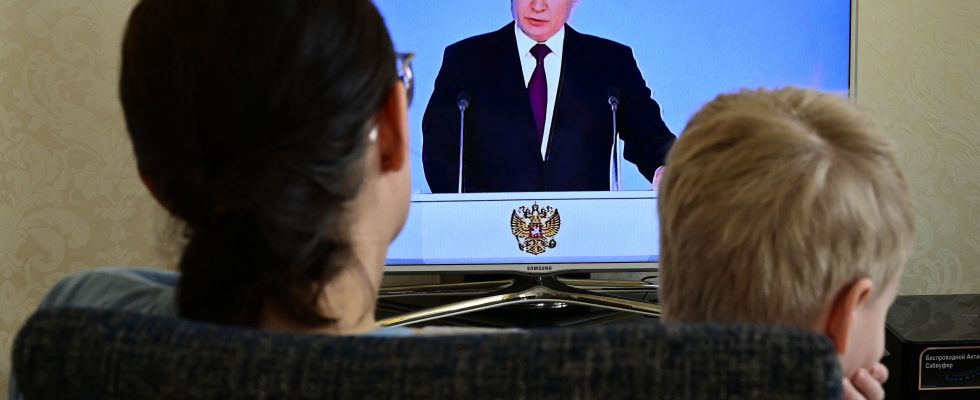“The exodus of the century” is how Vladislav Inozemtsev describes the departure of nearly a million Russians since the start of the invasion of Ukraine. Many of these “relokanty” (“relocated”) as they call themselves, prefer Europe as a destination, but many find themselves stuck in former Soviet states. If France begins to unblock its reception policy with a decision of the National Court for the Right of Asylum (CNDA) of July 20 now granting refugee status to Russians who refused to participate in the Ukraine war, the doctor of economics Vladislav Inozemtsev pleads to continue a more generous reception of Russians in Europe, as the latter would represent a significant financial windfall for European countries. Interview.
L’Express: How has Russia reacted to the influx of Russians leaving the country?
Vladislav Inozemtsev: This massive emigration represents a shock for Russia. Last year there were two big waves of emigration: the first appeared immediately after the start of the war, when many people left Russia in February and March in a kind of panic.
Since then, half of them have returned, because for “ordinary people” who are not politically engaged, it was not dangerous to return. If this first wave was not so important, the partial mobilization decreed in September had an enormous impact. About 700,000 Russians emigrated between September and October, and more than a million also tried to hide inside the country – a real internal emigration.
Do you think a new wave of mobilization is coming?
The situation degenerated so much during the first announcement in September that Vladimir Putin is now trying to avoid a new mobilization. In return, we observe that the government has increased the salaries of the military by tripling them, even quadrupling them between September and December 2022. All compensation has also been increased, for example the compensation paid to the relatives of soldiers who are killed. This shows that the government wants to persuade the Russians to engage other than by mobilizing them.
Is Russia putting in place, or trying to put in place, arrangements to bring back Russians who have left the country?
Yes, the government will ensure that these Russians come back, because the country will need them. It seems that Russia is engaged in the war for another year or two at least, and the internal situation in Russia has become rather stable again. Problem, the Russians are less and less numerous to return. While half of those who left in March 2022 have returned to Russia, the figure drops to 20% for those who left last September or October. This year, a new wave of emigration could well occur, which will concern the relatives (wives and children) of these exiles.
The majority of Russians went to post-Soviet states like the Caucasus or Central Asia. How can you explain these choices?
It was the most practical, because these are countries geographically close to Russia and for which, often, there is no need for a visa to return. Most of these Russian emigrants are quite active people, they are young. It was a first “stop” for them. The majority of them hope to go further West.
Do you think Europe should welcome them?
Yes, I strongly suggest that European countries open the borders a little to these Russian migrants with residence permits, because they represent a major economic benefit for European countries. A part of them owns real estate in Russia, so they can rent it and get income from it. Europe would find itself gaining an educated labor force; a real “professional emigration”, which should not be confused with the “partisans of the Russian world”, often favorable to far-right parties in Western Europe.
Which countries would they prefer to go to?
Eastern Europe is rather left out, as there is a lot of anti-Russian sentiment there. In my opinion, engineers and computer scientists would like to go to the Nordic countries, Germany or France… The places where you can work and do business.
But could they fit in?
Yes. They have a strong potential for integration, because Russia as a society has been very individualized since the end of the Soviet era, and even more so since the 1990s. In Vladimir Putin’s system, the credibility for any form of collective action has been undermined, and in fact, all initiative is done alone. The Russians will not expect any help from the diaspora on the spot, nor from the host country. I sincerely believe that it is easier to integrate Russians into the European Union than any other citizen of another country, since Russians do not want to remain Russian, they want to get rid of this stigma.
Is Europe ready to bring them in?
No, at least not yet. But I think that Europe does not sufficiently integrate the economic and social consequences that they can represent. Europeans are more concerned about hosting opposition Russian journalists or “Westernized” activists. These are people who adhere to European values, but they will not allow to change the political situation in Russia, because they do not send a strong enough message for Russian society.
They are often overlooked in the media scene. If there is to be change in Russia – and I think a coup in the near future is coming – that change has to come from within. When European governments bet on Russian entrepreneurs and workers, I am sure it will have an impact.
